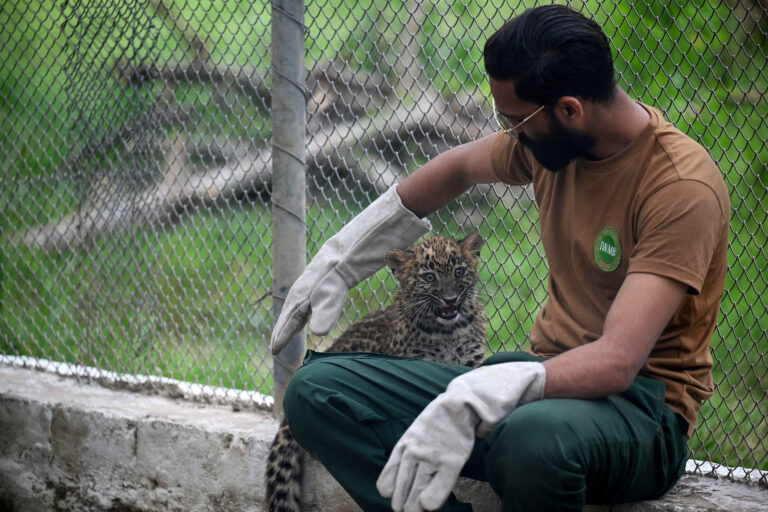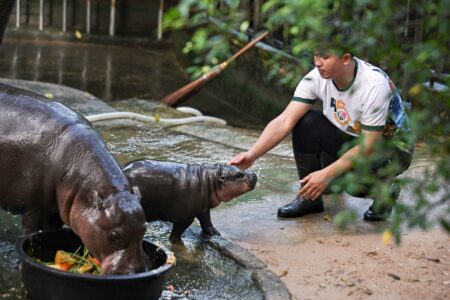
Animals can’t voice their desperation for help as their habitats are being threatened, but the urgency is clear.
More than 163,000 species are currently listed on the IUCN Red List, with over 45,300 species at risk of extinction. In just 40 years, global wildlife has plummeted by 60%.
This situation is not improving, and humans are to blame.
“We are sleepwalking towards the edge of a cliff,” Mike Barret, the Chief Scientist Advisor of WWF, told The Guardian. “This is far more than just being about losing the wonders of nature; it is desperately sad, though. This is now jeopardising the future of people. Nature is not a ‘nice to have’ – it is our life-support system.”
Barret is right.
When species go extinct, it creates an imbalance in the world’s ecosystem and the processes it maintains, such as the food chain or biotic pollination.
This is where specialists, geared up with wildlife conservation degrees, step in to safeguard both the creatures and the ecosystems they call home.
Wildlife conservation starts in our backyard
Many people assume that earning a wildlife conservation degree means travelling to distant places like Africa’s savannahs or the Amazon jungles. However, endangered species may be much closer to home than you think.
For those living in Asia, as of January 2024, there are over 18 endangered species in the region, according to the International Fund for Animal Welfare. These include orangutans, Sumatran tigers, bawean deers, rhinos, pangolins, Asian giant tortoises, and Himalayan quals.
In Europe, endangered species like wild hamsters, Mediterranean monk seals, and angel sharks are facing the threat of extinction.
Pursuing a wildlife conservation degree abroad can expand your understanding of global preservation efforts.
By bringing that knowledge back home, you’re not only contributing to the well-being of your local environment but also helping to protect the endangered species unique to your country.

Wildlife conservation is essential for future generations, and it is a key strategy to protect the environments where wild species live. Source: AFP
What do you learn from a wildlife conservation degree?
A wildlife conservation degree equips you with the skills to preserve, manage, and study wilderness areas, including plants, animals, fungi, and other forms of life.
This expertise extends to careers in zoological environments, aquariums, and other conservation settings.
You’ll also learn how to assess and protect threatened and endangered species, tackling critical issues such as habitat destruction, poaching, climate change, and the impact of human activity on the planet.
In short, you’ll become a guardian of animals and ecosystems worldwide — a real-life superhero for nature.
A list of key areas of study covered in this degree include:
- Ecology and ecosystems
- Wildlife management
- Biology
- Botany
- Soil science
- Animal nutrition and diseases
- Plant and animal biological diversity

Wildlife conservation goes beyond animals, it helps promote pollination and continuity of native plant species. Source: AFP
The careers a wildlife conservation degree can offer you
According to the US Bureau of Labour Statistics, careers in wildlife conservation are projected to grow by 4% to 5% between 2023 and 2033.
With this degree in hand, you have a list of careers to choose from:
Conservation scientist
Work to protect natural resources by managing and restoring habitats, developing conservation plans, and monitoring environmental health.
Environment consultant
Provide expert advice to businesses, governments, and NGOs on how to reduce environmental impact and comply with conservation regulations.
Park ranger
Oversees and protects natural parks and wildlife reserves, engages in public education, and enforces conservation laws.
Wildlife biologist
Researches animal species, their behaviours, and habitats to inform conservation strategies and understand ecosystem dynamics.
Wildlife rehabilitation specialist
Care for injured or orphaned animals, with the goal of rehabilitating and releasing them back into the wild.
Zoologist
Studies animals in captivity and the wild, focusing on species behaviour, health, and breeding, often working in zoos or wildlife sanctuaries.

36% of reef corals on earth are facing extinction, and it’s important to help preserve their habitat as corals are homes for marine life, providing food and shelter. Source: AFP
Indoor jobs to help wildlife conservation
Working in wildlife conservation doesn’t always mean spending your days in zoos, jungles, or wildlife parks.
If the idea of braving mosquitoes and spiders in tropical forests isn’t appealing, don’t worry — there are plenty of roles that keep you away from the great outdoors.
Here are a few examples:
Environmental consultor
Work with private companies or governments to help them assess environmental impact, develop sustainable practices, and comply with wildlife protection laws.
Environmental educator
Work in schools, museums, or community organisations to educate the public about wildlife conservation and sustainability to build environmental awareness.
Government agency worker
Work at governmental agencies such as the US Environmental Protection Agency or the National Fish and Wildlife Foundation to develop and enforce environmental laws, monitor wildlife populations, and design conservation policies.
Non-profit and NGO worker
Work with conservation organisations like The World Wide Fund for Nature (WWF), African Wildlife Foundation, or Oceana to engage with the public in advocating, fundraising, policy development, and education. Research, campaigns, and projects can be part of the job.
Research and academia
Working with universities, research institutions, or conservation organisations to conduct wildlife research, publishing studies, or teaching students about conservation biology and ecology.

Botswana tops the list of countries that are doing the most to protect wildlife. It has the highest conservation land ratios in Africa and more than 25% of its land area is reserved for parks and other reserves. Source: AFP
6 universities with the best Bachelor’s in Wildlife Conservation degrees
1. University of Prince Edward Island, Canada
If you’re looking to immerse yourself in practical, theoretical, and analytical wildlife studies for only US$8,410 a year, the Bachelor of Wildlife Conservation (BWC) at the University of Prince Edward Island is for you. Classes offered range from wildlife health, conservation genetics, and biogeography and macroecology.
To be eligible for the BWC programme, you must attend an accredited North American Wildlife Technology Association (NAWTA) college programme.
2. Bangor University, Wales
Attending Bangor University’s BSc in Wildlife Ecology and Conservation programme means you’ll be learning things hands-on. You’ll get to travel abroad for class field trips, work at local and international conservation organisations, and learn from the best in the industry.
The three-year programme costs 20,000 pounds (US$26,629) per year.
3. Unity Environmental University, US
Located in Maine, US, the Unity Environmental University is one of the best universities for environmental science, offering programmes in diverse fields of our natural world.
The BS in Wildlife Conservation degree here emphasises sustainable management of wildlife species through consideration of the applicable social, economic, and environmental concepts. Tuition costs around US$21,920 and can be completed in two and a half to five years.
4. Bath Spa University, UK
If you attend Bath Spa University, you’ll see a great variety of birds, including woodpeckers, nuthatches, kingfishers, and even sparrowhawks. It’s a perfect view of the wildlife Bath offers for when you’re enrolled in the BSc in Wildlife Conservation programme.
The programme, accredited by the Royal Society of Biology, allows you the opportunity to study abroad as well as gain hands-on experience in fieldwork and work placements. The tuition here is 17,670 pounds (US$23,527) per year.
View this post on Instagram
5. University of Guelph, Canada
Nestled in Ontario, Canada, the University of Guelph offers one of the best wildlife conservation degrees in Canada and the world. The programme will teach you how to protect biological diversity and tackle issues facing wildlife while gaining hands-on experience.
Additionally, the university is ranked in the top 20% worldwide for Biological Science by QS World University Rankings by Subject 2024 and #4 in Canada for Wildlife and Fisheries Management and Conservation by EduRank 2025.
Tuition here is 37,190 Canadian dollars (US$27,448) a year.
6. La Trobe University, Australia
One of the top 1% of universities worldwide, La Trobe University offers a Bachelor of Wildlife and Conservation Biology degree covering areas of science including botany, genetics, and zoology. The university also has an on-campus 30-hectare laboratory Wildlife Sanctuary, allowing for the best hands-on learning experience.
The three-year programme costs 42,000 Australian dollars (US$26,968) per year.
4 universities with the best Master’s in Wildlife Conservation degrees
1. University of Sassari, Italy
A Master’s Degree in Wildlife Management Conservation and Control from the University of Sassari comprises courses such as wildlife management, animal conservation genetics, microbial infections and control of infectious diseases, and more.
The postgraduate degree is two years long, including a 12-credit traineeship, and costs around 3,600 euros (US$4,077).
2. Edinburgh Napier University, Scotland
Edinburgh Napier University‘s MSc in Wildlife Biology & Conservation has a 100% overall student satisfaction score — proof that a postgraduate education, while hard, can be all you want it to be and more.
As the first and only programme in Scotland to be accredited by the Chartered Institute of Ecology and Environmental Management, students graduate here well-equipped to step into the world and make their positive mark.
The programme goes on for 12 to 18 months and costs around 20,395 pounds (US$27,163).
View this post on Instagram
3. Massey University, New Zealand
Home to unique wildlife that is unheard of in other parts of the world, New Zealand is the place for you to pursue a Master’s degree in Conservation Biology, specifically at Massey University. Here, you’ll learn to address real conservation management problems and take part in multiple field projects to experience the reality of conservation work in New Zealand.
The programme costs around 56,220 to 70,120 New Zealand dollars (US$33,355 to US$41,601) to pursue.
4. University of Bristol, UK
In collaboration with the Bristol Zoological Society, the University of Bristol‘s MSc Global Wildlife Health and Conservation programme will allow you to learn from global experts to prepare you for a career as a wildlife professional with the skills and knowledge to deal with a variety of practical situations that professional wildlife biologists face on a day-to-day basis.
The University of Bristol also partners with global conservation organisations to support you in developing and conducting a research project in your area of interest. The organisations include the Cheetah Conservation Fund, Wildfowl and Wetlands Trust, National Wildlife Management Centre, RSPCA West Hatch Wildlife Centre, and more.
Tuition for the one-year programme costs 32,900 pounds (US$43,808).
Disclaimer: This article was last updated on May 2, 2025.










